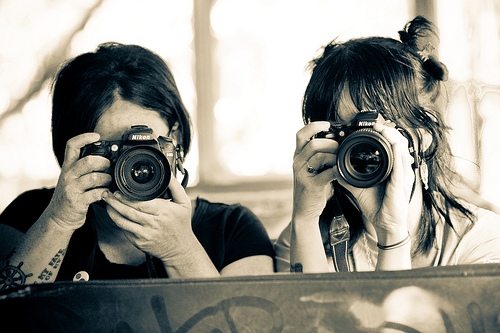
If you’re serious about starting a career in photography, getting your diploma at the photography school is not enough. Even though photography schools play a vital role in imparting the technical theories, there are some things that only experience can teach you — your own experience or the experience of others.
Most of the professional photographers are self learners and have come to take up photography as a profession owing to their passion for making beautiful pictures. I came to realize this fact after interviewing some of the well-known photographers in the industry. Sometimes working as an assistant photographer (like Jim Jordan) pays you off and at other times self learning (Scott MacQuarrie’s approach) is what makes the all difference. Whatever the case be, exhausting all the options help you in defining and refining yourself as a professional photographer.
So while you learn most of the photography basics and fundamentals at photography schools, here are some of the things that you learn when you step in the foot of a photographer.
-
Your Photography Diploma Will Not Get You A Job
If you think graduating from Brooks or other big names will help you get the job, it’s not necessarily true. Getting started as a commercial photographer really depends on the quality of images you make. Your ability to strike chords by creating eye-catching images is what helps you in establishing yourself as a photographer. In a nutshell, it’s your work and portfolio that works wonders for setting a firm foothold in the market.
-
Be Open To Opportunities, Don’t Stick To A Specific Type Or Genre Of Photography
Even though photography schools may suggest you to specialize in a particular genre, to succeed as a photographer you should be open to all sorts of opportunities. Photograph more as a generalist and get a fair idea about various types of photography. Nail it down to the photography basics of exposure, composition and lighting & practice the basic fundamentals with whatever the subject be. This will act as a good warmup for establishing yourself as a specialty shooter and will get you started with making decent money as a starter.
-
Work As Assistant Photographer — Step Into The Real World Scenario
Internship is the industry standard for all sorts of practical oriented vocational courses. Working as an assistant to the photographer in this matter acts as a giant leap. While working with a professional photographer you gain a valuable insight into their photographic workflow — how they get the clients, what techniques do they use, how do they control light and other variables while shooting and all the practical knowledge which you somehow fail to learn in the photography schools.

-
Learn From Other’s Work — Copying Ideas Is Not As Bad As It Sounds
Be original and develop your photographic skills is the kind of idea promoted by photography schools. But there is nothing wrong in copying the ideas of famous photographers. It is when you do so that you discover new techniques and styles. The entire procedure of imitating the works of the masters help you a lot in learning the finer nuances of the art; which ultimately help you in becoming a better artist.
-
You Don’t Always Learn By Taking The Pictures; Get Inspired
Take picture, take a lot of them, take a few more and practice, practice, practice. Is it the only way to excel in your art? No, you don’t always learn by taking the pictures. You can learn helluva by studying the pictures — be it the photos taken by you or others. Closely observe the details that make a particular image attractive. Or just go through your best pics of all times. Spend some time with your artistic creations — it will charge your creative gears. And then will pave way for a new round of learning — this is what the photography school is all about.
-
Photography Is Not Just The Art Or Technique Of Making Good Photos, It’s Also About Marketing
Freelancing, editorial photography or commercial photography; whatever you choose as your profession, one requirement that remains constant is that you need to market yourself. Let your potential clients know about you, your capabilities, your charges, your working style, your photographing style and nonetheless give them a reason to consider you for the kind of services you offer. Marketing plays a crucial role in getting the clients. You really need to be versatile at this one — an active social media profile, networking, local advertisements, the portfolio site and good relations with existing customers all work in getting you business — photography projects & assignments.

-
It’s Not The Camera, It’s The Photographer
Latest camera reviews and specs deceive us all in thinking that buying a better camera will help in getting the best images ever. Don’t be fooled by the marketing gimmicks of camera manufacturers — after all it is not the camera but your capabilities and skills as a photographer that shows up in the pictures you make. Check out why your camera doesn’t matter here.
-
Expect The Unexpected — Most Of The Good Photographs Happen Accidentally
Pre-planning is not the sure shot formula of getting the images you want. You can get some great images even when you are out for a casual photo-walk. The key lesson to take is — keep the camera handy and be ready to photograph the unexpected. Here is an interesting column by Harold Davis where he discloses the secret of making compelling imagery.

-
Photography Is An Ongoing Process
Photography is an ongoing process — you learn as you do and you do what your learn. Trying hands at a new technique for the first time requires you to be thorough with the research and testing. But once you learn the technique, you can easily apply it under various circumstances. This rule applies not only to the technicalities of photography, it comes into foreplay even when building the clientele. You have to plan well for the session and deliver the quality to the first comers. This helps in building the brand for yourself. And once you do so, delivering quality becomes your second nature and your brand becomes the word of mouth for your customers.
-
You Need To Work Your Shots
Another valuable tip you will never get to learn in the photography school is to work the shots. Working the shots is the pro technique of refining the image by taking multiple shots of the scene by changing the angle of view or by moving closer (or further away) from the subject. Learn more about working the shot here.
Did you miss something in your photography school?


Photography is like any other profession – your diploma may get your foot in the door, but what happens after that is totally what you make of the opportunity.